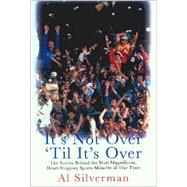The thirteen accounts in this memorable book celebrate the uncompromising unwillingness to quit that has proven, time and again: you had better not leave the stadium early. Among the stirring events relived here, in their historical context and glory, are the sixth game of the 1975 Red Sox-Reds World Series; the tumultuous 1971 Frazier-Ali fight; and the only sudden death pro football








